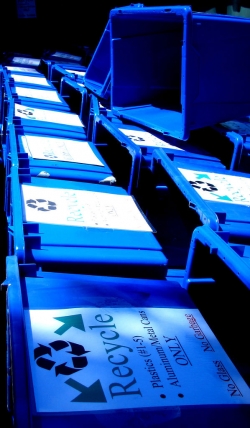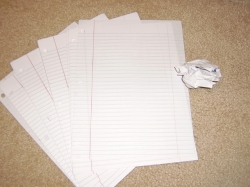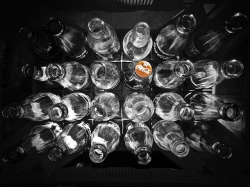Imagine if every person in the world acted the same way you did. If you drink a glass of water, seven billion people drink a glass of water. If you throw a piece of paper on the ground, seven billion people throw a piece of paper on the ground. You have seven billion puppet strings tied to your arms and legs so that everyone will copy you. Of course, this is not how the world works. Some people treat our world better than you do. Others treat it worse. But for each action you take, it helps to ask "What if everyone else did what I'm doing?"
Your stomach rumbles, and it echoes like thunder around the whole world. Everyone else is just as hungry as you are. You go and pick a piece of fruit. So does everyone else. You pull vegetables from the soil. So does everyone else. You and everyone else eat billions of cows and scoop billions of fish out of the sea. Don't worry. Fruits and vegetables can grow back, right? More animals can be born.
Renewable resources are things people use that can grow back or replenish over time and won't run out. Water, sunlight, and wind, are all examples.
Most things on Earth are a part of a cycle. Wind, rain, trees, and animals all come and go or live and die. This means you can also cut down a few trees in order to build a house. The Earth fills with the sounds of saws.
So long as you are careful and don't use up too many animals or trees, things will grow back. As things live and die, new things will grow to take their place. To
replenish means to fill up again or restore the supply. Over time, the fish lay eggs and make more fish. The animals have more babies. The tree seeds turn into sprouts, which turn into new trees, which turn into forests. The sun makes water from the ocean rise into the sky, turn into clouds that rain down to give us more fresh water. If people are smart, a lot of the living things they take will grow back before they die. It's just important to think about what you're using and if it can come back on its own.
Uh-oh. Winter is here. In order to make catching animals and cutting down trees easier, you could definitely use some tools. For these things, you'll have to dig down into the earth and pull metals and fossil fuels from deep in the crust. Ahh, that's better. Now you can use metal tools to cut down more trees, while the fuels can be used to make electricity. Just remember: not too much.
Non-renewable resources are things that you use, but cannot be replenished in your lifetime. Oil is a great example of this, because it takes more than one hundred million years for the Earth to make more! Each time you drive your car, that fuel you used is now gone. Some resources form more quickly, but because there are so many people on Earth we might use them more quickly then they come back. This means you are really going to have to be careful with how much you use. Remember, seven billion people are copying your every move.

Recycling: Just do it!
Joel Bombardier/Flickr.com
There is only so much oil inside the Earth. There is only so much metal that we can pull from special rocks. So you will have to make sure and only use it when you really, really need it. Some metals, on the other hand, can be used again for different things. Recycling is when we take something that was already used and turn it into something we can use again. You can melt some plastic or metal down to make them into something else. We can reuse old paper to make new paper! This does not make these things renewable, but it helps us use what we have to the fullest. Melting things down does not work for everything. Some things take so much energy to melt down or recycle that we'll use even more resources to try to reuse them.

Paper can almost always be recycled!
stacyinbody/Flickr.com
Now you can see why we have to be careful with the resources in our world. Sure, some of them are renewable, meaning the Earth will replenish them, growing them again in our lives. But the things we use that come from deep in the earth, like metal and oil, are non-renewable resources, meaning they take a very, very long time to come around again. This means we need to find ways to recycle, taking the things we have already used and melting them down to be used again as something else. You may not have the whole world copying your every move, but when it comes to Earth's resources, we all could stand to be a little more careful.

Glass can be melted down and made into other things.
Hernán Piñera/Flickr.com
References:
Environment
and Ecology Series. "Renewable and Non-Renewable
Resources" psu.edu, 2015.
<http://extension.psu.edu/publications/uh177>
Recycle for your community. "What
does it get turned into?" recycleforyourcommunity.com, 2016.
<http://www.recycleforyourcommunity.com/about_recycling/what_does_it_get_turned_into/>
King, Hobart. "REE "" Rare Earth
Elements and their Uses" geology.com,2016.
http://geology.com/articles/rare-earth-elements/